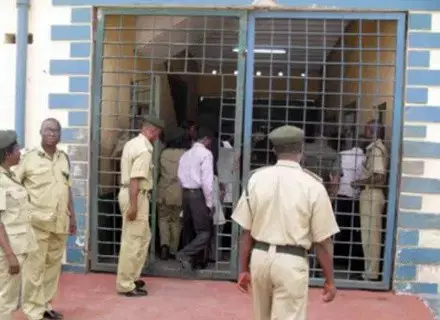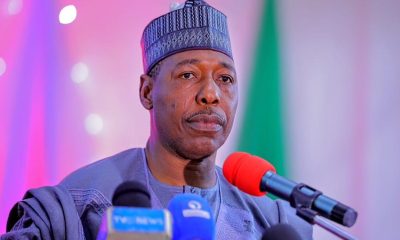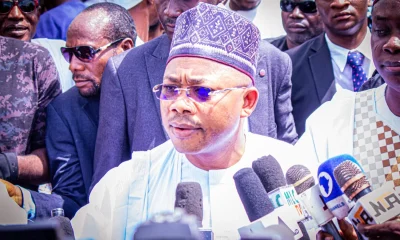COVER
Food Inflation: FG Moves to Revive Commodity Board

By David Torough, Abuja
Following the continuous upsurge in prices of food commodities, the Federal Government is reconsidering the establishment of a National Commodity Board as a solution to the escalating food prices in the country.
Recall that there have been protests in some parts of the country in recent times as a result of skyrocketing prices of food items.
Vice President Kashim Shettima at a two-day high-level strategic meeting on climate change, food systems and resource mobilisation held at the Banquet Hall of the Presidential Villa, Abuja on Tuesday said the government of President Bola Tinubu was concerned about the plight of Nigerians, stressing that efforts were underway to mitigating the hardship.
The Vice President in a statement by his spokesman, Stanley Nkwocha said, in tackling price volatility, the board would be given the mandate to assess and regulate food prices, as well as maintain a strategic food reserve for stabilizing prices of crucial grains and other food items.
Shettima said the two-day event was an attestation of Nigeria’s efforts at mitigating the effects of climate change and ensuring food security for Nigerians.
Recalling that food security was one of the eight areas of priority declared by President Tinubu as part of his Renewed Hope Agenda, which led to the declaration of a state of emergency on food security, the Vice President highlighted ongoing policy reforms by the administration to ensure food and water availability, as well as affordability.
The Vice Present said, “Our solution to the potential food crisis has become immediate, medium, and long-term strategies. The short-term strategy entails revitalising the food supply through specific interventions like the distribution of fertilizers and grains to farmers and households to counteract the effects of subsidy removal; fostering collaboration between the Ministry of Agriculture and the Ministry of Water Resources for efficient farmland irrigation, ensuring year-round food production, and addressing price volatility by establishing a National Commodity Board.
“This board will continually assess and regulate food prices, maintaining a strategic food reserve for stabilizing prices of crucial grains and other food items.”
He assured that while the Tinubu administration has fully invested in the restoration of degraded land, there were ongoing plans “to restore four million hectares, or nearly 10 million acres, of degraded lands within” the nation’s borders as its contribution to the AFR100 Initiative.
On how the government was handling the security challenges that have prevented farmers from working on their farms, he said, “I wish to assure you that we will engage our security architecture to protect the farms and the farmers so that farmers can return to the farmlands without fear of attacks.
“We won’t only make it safe for farmers to return to their farms, but we will also ensure the activation of land banks. There are currently 500,000 hectares of already mapped land that will be used to increase the availability of arable land for farming, which will immediately impact food output,” he added.
Shettima further said that the Tinubu administration was also collaborating “with mechanization companies to clear more forests and make them available for farming,” even as the Central Bank of Nigeria “will also continue to play a major role in funding the agricultural value chain.
“We will deploy concessionary capital to the sector, especially towards fertilizer, processing, mechanization, seeds, chemicals, equipment, feed, labour, among others. The concessionary funds will ensure food is always available and affordable, thereby having a direct impact on Nigeria’s Human Capital Index (HCI). This administration is focused on ensuring the HCI numbers, which currently rank as the 3rd lowest in the world, are improved for increased productivity.”
Shettima restated frantic efforts by the administration “to ensure a massive boost in employment and job creation”, noting that it “is another presidential area of priority.
“The government will make agriculture attractive for our teeming youth population with a view to creating between 5 to 10 million more jobs for them within the agriculture value chain, working with the current 500,000 hectares of arable land and the several hundreds of thousands more farmlands to be developed in the medium term,” he pointed out.
The vice president said that the efforts were part of the federal government’s bid to actualize the “UN-Agenda 2030 on Sustainable Development Goals 2 of “Zero Hunger” and African Union Agenda 2063, which aims to transform Africa into a global powerhouse of the future.
“But we can’t achieve this unless we guarantee food security by building the capacity of smallholder farmers who account for about 88% of the total food production in Nigeria.”
He implored those at the event, including development partners, private investors and diplomatic community, among others, to make sure the high-level engagement results in a positive outcome.
In his address, the African Union Chairman of Food System, Dr Ibrahim Maiyaki, said the challenges that will confront Africa in the next 20 to 30 years could be tackled through three parameters: the continent’s know-how, expertise and leadership.
Maiyaki called for strong regional integration through food transformation as well as boosting productivity and economic growth rates through the right policies and governance objectives.
Also, the National Coordinator of NEPAD, Gloria Akobundu, praised President Tinubu for his efforts towards making Nigeria a great nation.
COVER
FG Disburses N5.12bn Pension Arrears to 90,689 DBS Pensioners

By Tony Obiechina, Abuja
The Federal Government has released funds for the disbursement of N5.12 billion in pension arrears to 90,689 Defined Benefit Scheme (DBS) pensioners under the Pension Transitional Arrangement Directorate.This was contained in a statement by the Head of Corporate Communications of PTAD, Olugbenga Ajayi.
He said that the directorate had finalised the disbursement of the money. The Nigeria Customs Service, the Nigeria Immigration Service, and Prisons Pension Department (CIPPD) pensioners are 8,626, received N276,032, for one-month arrears; the Police, Pension Department (PPD) pensioners are 9,681, received N619,584, for two months as arrears. The Civil Service Pension Department (CSPD) pensioners are 12,773, received N408,736, for one-month arrears, and the Parastatals Pension Department (PAPD) pensioners are 59,609, received N3,814,He said that the payment reaffirms the administration’s commitment to ensuring that pensioners receive their due entitlements in line with the Renewed Hope Agenda of President Bola TinubuAccording to the statement, the approvals align with the President’s Renewed Hope Agenda.“This move shows President Tinubu’s strong commitment to senior citizens’ welfare and marks a new era in DBS pension management,” said PTAD, Executive Secretary, Tolulope Odunaiya.Among the key measures is the immediate implementation of an extra budgetary allocation to enforce new pension rates for DBS pensioners.The President also endorsed the adoption of a proposed pension harmonisation policy, which will be incorporated into the 2026 pension budget. Additionally, health insurance coverage for all DBS pensioners has been approved, ensuring access to essential healthcare services.The proposed reforms include a new pension rate of N32,000 and incremental increases of 10.66% and 12.95% for pensioners from defunct and privatised agencies. Other components of the reform package include harmonisation of pension rates across all DBS pensioners and their enrolment into the National Health Insurance Scheme (NHIS).In June, PTAD announced the successful disbursement of N8.6 billion in pension arrears to 148,625 eligible DBS pensioners across various sectors. The payments reflect the implementation of the N32,000 pension increment approved by President Tinubu in 2024.PTAD had previously settled arrears related to the first pension increment of 20% to 28%, which came into effect in January 2024.COVER
NAF Offensive Decimates 592 Terrorists, Destroys 372 Assets in Eight Months

By David Torough, Abuja
The Nigerian Air Force (NAF) has killed no fewer than 592 terrorists and destroyed 372 enemy assets in Borno within the last eight months, surpassing the total operational gains recorded in 2024.A statement by NAF’s spokesman, Air Commodore Ehimen Ejodame yesterday said the Chief of the Air Staff (CAS), Air Marshal Hasan Abubakar, said this during a courtesy visit to Gov.
Babagana Zulum of Borno. Abubakar said the offensive had destroyed 206 technical vehicles and 166 logistics hubs in deep hostile territory, with coordinated day-and-night strikes from Gonori to Rann, Dikwa to Damboa, Azir to Mallam Fatori.He said the offensive had been boosted by the deployment of A-29 Super Tucano aircraft capable of precision and night missions, Mi-171 helicopters for medical evacuation and logistics, and enhanced intelligence, surveillance and reconnaissance platforms for round-the-clock target tracking.He added that a new Mi-35 gunship was expected to further intensify close-air support for ground troops in the theatre.“Backed by an upgraded fleet and precision night-strike capabilities, NAF aircraft executed 798 combat sorties, clocking over 1,500 operational flight hours in the Air Component of Operation Hadin Kai.“This year, our air war is faster, sharper, and more surgical.“We are taking out high-value targets, crippling their logistics, and hunting down every cell that threatens the peace of the North-East,” he said.The CAS also praised the “Borno Model” of combining community-driven non-kinetic measures with decisive military action, saying it had proven effective in the counter-insurgency campaign.He also inspected facilities at the NAF Base, met with aircrew and ground personnel, and received operational briefings.He reaffirmed the NAF’s commitment to precision air power, intelligence-led operations, and inter-agency collaboration to protect Nigerians.In his response, Gov. Zulum praised the NAF for its sustained air support in degrading terrorist capabilities and protecting communities.According to him, the NAF has been a steadfast partner in their fight against insurgency.“Your operations have saved countless lives and allowed our communities to begin rebuilding.“The people of Borno recognise your sacrifices and stand firmly behind you,” he said.COVER
Over 8,000 Mentally ill Inmates in Custody Nationwide, Says NCoS

By Divine Ndukwe, Abuja
The Nigerian Correctional Service (NCoS) has disclosed that at least 8,246 inmates across the country’s custodial centres are living with mental health conditions.Assistant Controller General of Corrections in charge of Medical Services, Dr.
Glory Essien, revealed the figures yesterday in Abuja during the third public hearing of the Independent Investigative Panel on Alleged Corruption, Abuse of Power, Torture and Other Inhumane Treatment by the NCoS. Essien described incarceration as a deeply stressful experience, noting that the loss of freedom can trigger or worsen mental health conditions. She explained that inmate-leaders are trained to identify and report cases of psychological distress for early intervention, but available resources remain insufficient.“If you’re in a facility housing 500 to 1,000 inmates, with just one doctor or psychologist, monitoring everyone individually is impossible,” she said, citing logistical and funding challenges that hamper adequate care.Similarly, the NCoS Assistant Controller General in charge of Pharmaceutical Services, Mohammed Bashir, acknowledged that drug shortages and limited staffing remain major obstacles despite government funding.He revealed that a psychological services unit has been established, partnering with psychiatric associations to visit major facilities, though resources still fall short of demand.Permanent Secretary in the Ministry of Interior, Dr. Magdalene Ajani, called for urgent private sector support, stressing the need to deploy more psychiatric professionals to underserved states. “Please come to Macedonia and help us,” she appealed to the Nigerian Medical Association and pharmaceutical companies.Meanwhile, in Kwara State, the Nigerian Medical Association (NMA) has expressed alarm over rising mental health issues among doctors, linking the trend to burnout, workplace violence, and poor working conditions.Kwara NMA Chairman, Prof. Olushola Abdulrahman Afolabi, said a significant proportion of doctors experience depression, anxiety and other psychiatric disorders, often without seeking help due to stigma.Former NMA chairman, Prof. Issa Baba Awoye, warned that current figures could be worse than past studies, especially in resource-poor settings.The NMA is advocating for mandatory mental health evaluations for doctors, alongside increased awareness and stigma reduction campaigns. “Our healthcare system can only be as strong as the mental and physical well-being of those who sustain it,” Afolabi stated.Both the NCoS and NMA agree that mental health care must be prioritized, not just for inmates, but for those tasked with caring for the nation.































